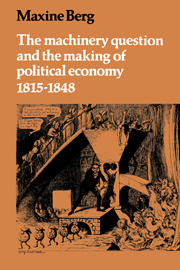Book contents
- Frontmatter
- Contents
- List of Illustrations
- Preface
- Introduction
- PART ONE THE MACHINERY QUESTION
- PART TWO THE POLITICAL ECONOMY OF MACHINERY
- 4 Ricardo's chapter
- 5 Political economy and the division of labour
- 6 Political economy and capital
- PART THREE A SCIENCE OF MACHINERY
- PART FOUR THE POLITICS OF MACHINERY
- PART FIVE THE SOCIAL CRITICS OF MACHINERY
- EPILOGUE: BEYOND MACHINERY
- Bibliography
- Index
- Frontmatter
- Contents
- List of Illustrations
- Preface
- Introduction
- PART ONE THE MACHINERY QUESTION
- PART TWO THE POLITICAL ECONOMY OF MACHINERY
- 4 Ricardo's chapter
- 5 Political economy and the division of labour
- 6 Political economy and capital
- PART THREE A SCIENCE OF MACHINERY
- PART FOUR THE POLITICS OF MACHINERY
- PART FIVE THE SOCIAL CRITICS OF MACHINERY
- EPILOGUE: BEYOND MACHINERY
- Bibliography
- Index
Summary
Ricardo created a new conception of political economy. Against a background of institutional and theoretical diversity in the discipline he moulded an original and unified body of theory. To contemporaries this appeared as a consolidated set of principles so systematic in nature as to be called a science. But it also appeared as a corpus of doctrine so strictly applied and so closely connected to politics and personalities that it became a creed termed Ricardianism.
Ricardo's originality lay partly in his methodology, for his systematic approach to political economy involved the explicit use of models as a basis for explanation. But it also lay in the combination of problems, judgements and conclusions he so effectively combined to provide the authority needed by contemporaries seeking a policy in a very confused economic setting. Ricardo's intervention both in politics and theory provided the connection between appraisal and policy required at the time for the strains of an unprecedented and complicated economic transformation.
The received view of classical political economy in this period emphasises its pessimism. Adam Smith's sanguine affirmation of the implications of the division of labour is contrasted with ‘Malthusian’ fears of overpopulation, ‘Ricardian’ predictions of the advent of the stationary state, and the classicals' apparent indifference to the impact of technological change. Schumpeter's criticism and explanation of the ‘pessimistic’ perspective supposedly to be found in the works of Ricardo, Malthus and Mill are exemplary of many.
Those writers lived at the threshold of the most spectacular economic development ever witnessed. Vast possibilities matured into realities under their very eyes. Nevertheless they saw nothing but cramped economies, struggling with ever decreasing success for their daily bread.
- Type
- Chapter
- Information
- Publisher: Cambridge University PressPrint publication year: 1980
- 1
- Cited by

